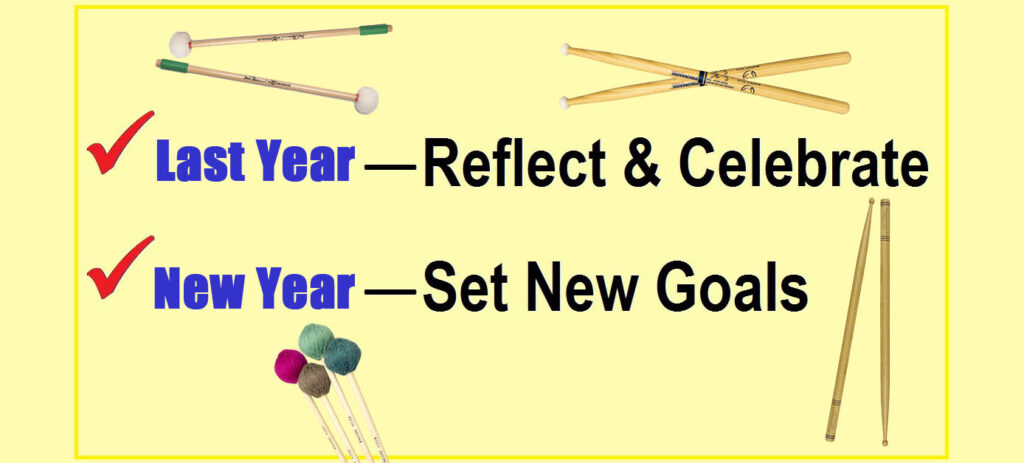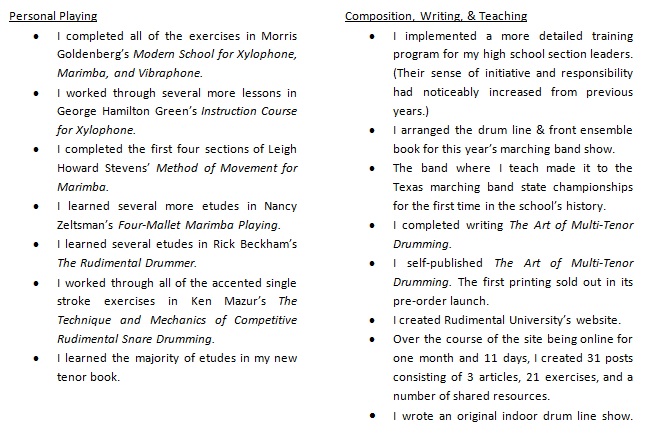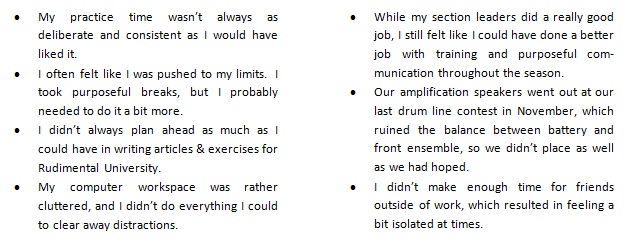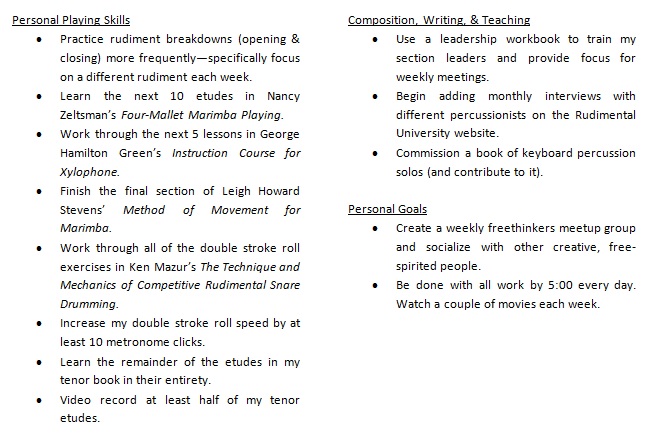
For the first few days of the New Year, you will undoubtedly see various individuals and organizations urging you to create new goals, set New Year’s resolutions, turn over a new leaf, and do whatever you can to make this year better than last year. Of course, I know readers would be terribly disappointed if I didn’t give similar encouragements with regard to percussion. 🙂
However, I don’t want to offer blanket statements about overly ambitious goals that have little chance of getting accomplished. I genuinely want you to be successful in reaching new heights. In this article, I want to focus on two key elements often overlooked: 1) reflecting upon last year and celebrating its successes, and 2) setting high goals for this year in a realistic and attainable way. (Hint: your system is more important than the goal.)
Four Important Questions
In the effort to get things done, it’s very easy to move from one thing to the next without taking time to reflect. I believe the reflection process is vitally important. It’s the only way to learn and improve. For this process, here are four questions to ask yourself:
- What did I accomplish last year?
- What were the key factors that made my successes work?
- What hindered me from accomplishing certain goals last year?
- What will I improve upon from last year?
Of course, you could apply these questions to any area of your life, not just percussion—and I would encourage you to do so. But I would especially encourage you to think about these questions specifically as they relate to your percussion playing (and composing or teaching, if applicable). Let’s examine each question in detail…
Celebrate!
What did I accomplish last year?
Michael Hyatt says, “I firmly believe in celebrating our wins… When we celebrate reaching our milestones, we stay emotionally engaged for the long haul.” It’s important to train your brain to expect a reward, a period of celebration, at the end of hard work. It helps you stay focused for future endeavors.
I’d encourage you to take a few minutes and write down the things you have accomplished this past year. For illustration, I’m going to use myself as an example throughout the remainder of this article. (I don’t really like talking about myself in these types of situations, but I’m just going be open and present the good, the bad, and the ugly here.) With regard to percussion, it covers a lot of my life. I am a performer, teacher, author, and (most recently) host of Rudimental University. While there is some definite overlap in these areas, I broke it down into two categories—my personal playing and the things I’ve done to help others in their playing (including compositions and arrangements). You can use my list as an example:

I could have also listed things such as successfully pulling off our annual spring percussion concert, the band’s success during concert band, etc., but I just wrote down the things that stand out as the most significant to me. This criteria is my own personal feeling, and everyone’s list will look a bit different.
If you are a student, you might do something similar by looking at skills you have developed and what you have done as a student leader to help your peers (or composition assignments you have written or anything else music related). If you are a percussion instructor, your list may look quite similar to mine. If you are primarily a professional musician, you may look at the skills you have developed and the achievements you have made on the business side of things. If you simply play percussion in no other capacity but for the sheer joy of it, your list may look like my first column.
Once you have made your list, step back for a moment and look at it. You may have accomplished a great deal, or you may have accomplished just a few simple things. Either way, take a few minutes and appreciate yourself. Pat yourself on the back for your achievements.
Identify What Works
What were the key factors that made my successes work?
Undoubtedly, you have certain habits and systems in place. It’s important to examine them and see what is working well. Again, here is my list as an example:
There are probably other things that are such a part of my daily routine that I didn’t even think to include here, but these are some of the main things that have helped me accomplish my goals this past year. Take some time to reflect on the things that have helped you.
Identify Hindrances
What hindered me from accomplishing certain goals last year?
Now it’s time to examine some of the things that prevented you from moving forward. These things could be personal mindsets, decisions, and behaviors, or they could be circumstances that were beyond your control. Once again, here is my list:

As you can see, even though I accomplished a lot this year, I am far from perfect. I could have been more disciplined with my practice time, planning, and work environment. With friendships, I allowed things to get out of balance at times. I am okay with doing that for a season (publishing a book and launching a website were goals that were important to me), but this list helps me to realize that I need to make a concerted effort to balance things out more this next year to preserve my own sense of well-being.
I want to build upon what I have done with section leaders this past year and take it further next year. As for the amplification speakers going out at the final drum line contest, there wasn’t much I could have done about that at the time. (It happened right as we went on to perform.) Sometimes you just have to acknowledge setbacks, realize that life is imperfect, and be okay with that. The drum line still performed really well this year, and I was proud of their playing accomplishments.
Your list will probably look very different from mine, but these are just a few ideas to get you started. Of course, you may have had some major setbacks in your personal or professional life. You may have struggled with illness or physical limitations that affected your playing or other areas. You may have suffered incredible loss. You may have some incredibly limiting and destructive beliefs about yourself or others that need to be addressed. Whatever your situation, it’s important to acknowledge these things, make peace with them, and move forward.
In chapter 13 of his book Coming Home to Who You Are, counselor and author David Riche says, “Life has certain givens, certain unavoidable facts. Five stand out for all of us: Everything changes and ends; things do not always go according to our plans; life is not always fair; suffering is a part of everyone’s life; people are not always loving, honest, generous, loyal—nor can they be expected to be.”
Riche goes on to say, “An unconditional yes to these facts of life is… aligning ourselves to reality… We do all we can to change the things that can be changed and, with equal alacrity, to accept what cannot be changed.” He concludes, “As we practice our unconditional yes, without protest or complaint, we notice that we no longer ask, ‘Why’ or ‘Why me?’ Now we simply say, ‘Yes, now what?’ This is a giant step into adulthood because our focus is on how to move on with our life, not on how immobilized we are as victims.”
In short, take time to acknowledge the things that were out of your control, and grieve them if necessary. Then move on to go forward with the things you can control.
Go to the Next Level
What will I improve upon from last year?
Finally, once you have taken time to celebrate, examined what you are doing well, and taken an honest look at things that have hindered you, you are ready to synthesize all of this information and start creating a new positive direction for yourself.
As I hinted in the opening paragraph, the system you have to accomplish your goals is more important than the goals themselves. Of course, you need meaningful goals. But if you have a good system in place, the goals will inevitably follow. A “good” system is the system that you will actually use. You can plan to practice six hours every day, exercise regularly, and eat perfectly balanced meals. However, if you aren’t actually going to do it, it’s not a good system.
For myself, I know that my schedule is busy, and I have to fit in practice time wherever I can. I have written down a few goals I hope to accomplish over the next year. I may surpass some of them, but I kept them at the level that I would consider highly realistic, even with major unexpected events. Here is my list for next year:

Of course, I have other goals in the “I also really want to do that” category, and I will work toward them as well. (Some of them are long-term projects for Rudimental University that I’m not ready to make public yet.) I will also undoubtedly think of additional goals as the year progresses. But the goals above are what I would consider minimally acceptable, so long as my current circumstances continue. Something such as a personal injury or death of a loved one might occur, and I might have to alter my goals. But the important thing is that I have goals. If something unforeseen happens, and I only end up learning five of the Zeltsman etudes instead of ten, is it the end of the world? No, I will have still learned five and gotten better—and that will be something to celebrate. (I’ll just have to assess what hindered me and do better next time.) I’ll probably try to finish all of the etudes this year, but I set ten as a realistic number, given my current schedule and goals. If I find additional time, I’ll certainly learn more than ten.
As I said, I know my current schedule, commitments, goals, and personal energy levels, and I feel like these are attainable goals for me in my current season of life. Other people might be able to accomplish a lot more or a lot less. I won’t tell you what my whole system is, because it works for me and probably won’t work the same way for you. Here are just a few questions to ask yourself in setting goals:
- Is this really important to you? (If not, is it worth doing?)
- Is this realistically attainable with your current schedule and abilities? (If not, could you scale back on the goal just a little bit? If you accomplish more than that, it will be bonus!)
- Are there other things you need in place to accomplish these goals? (These may become additional goals.)
- How will you feel once you have accomplished this goal? (Remember this feeling, and use it as motivation when working toward it.)
Conclusion
At the risk of sounding cliché, you can make 2017 your most productive and rewarding year ever if you take the time to plan for it! A vital part of the planning process is to celebrate and reflect on the previous year. You can check back with me next year to see if I have accomplished all of the goals I have set for myself. I’ll be interested to see if you have accomplished yours. If you want to hold yourself accountable, post some of your playing goals in the comments section at the bottom of this page. Check back again next year and report how you did!
What do you think? Are there any important steps you take in making goals? What helps you and hinders you in making progress? Do you want to share some of your goals with the Rudimental University community? Leave your thoughts, tips, and goals in the comments section below. Happy New Year!

